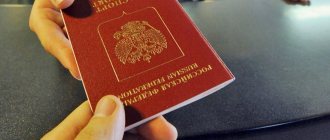Police, Ministry of Emergency Situations, collectors, firefighters, military commissars, workers of public utilities and management companies: who must be allowed into the apartment and who should not? We understand the exceptions to the general rule on the inviolability of home and private property.
Police, Ministry of Emergency Situations, Housing Office, emergency services, collectors, National Guard, bailiffs - who has the unconditional right to enter the home. The right of citizens to the inviolability of their home is guaranteed by the Constitution of the Russian Federation, albeit with some reservations. The inviolability of an individual’s home may be limited by law in exceptional situations when public interests require it. This can be done by the court or those government bodies that are given such a right by law. There is a whole circle of people whom everyone is obliged to let into the apartment upon request. And for refusal to open the door for them or provide free access to housing, liability is provided. Therefore, everyone should know who can be denied a home and who cannot. And what to say and do if such unexpected guests come.
Open up, police!
According to the police law, police officers have the right of access to citizens' residential premises. But only if they have a warrant, if they have reasonable grounds to believe that a criminal is hiding or a crime is being committed there, or if they believe that someone's life is in danger behind closed doors. If in the first case everything is clear - there is a corresponding document, then in the other two you can only rely on the fact that the policeman’s suspicions will turn out to be unfounded and the police will leave the apartment, perhaps even with an apology. By the way, the security forces do not choose how to enter a home in such a situation; they can knock down the door or break a window. Obtaining compensation for damaged property can be difficult and time-consuming, even if the police were wrong. Therefore, if the police ring at the door, it is better to answer immediately. Employees of the FSB of Russia and employees of the Russian Guard have similar powers.
Penetration of police officers into residential premises is permitted in cases provided for by the legislation of the Russian Federation, namely:
- if it is necessary to carry out an inspection of a home when a police officer presents a court decision in the absence of consent to inspect the home of the persons living in it, as well as a search and seizure of a home when a police officer presents a court decision. Moreover, in exceptional cases, when the inspection of the home, search and seizure of the home cannot be delayed, these investigative actions can be carried out on the basis of a decision of the investigator or inquiry officer without obtaining a court decision. In this case, the investigator or inquiry officer, no later than 3 days from the start of the investigative action, notifies the judge and the prosecutor about the investigative action. Attached to the notification are copies of the resolution to carry out the investigative action and the protocol of the investigative action to verify the legality of the decision to carry out the investigative action. Having received this notification, the judge checks the legality of the investigative action taken and makes a decision on its legality or illegality;
- to save the lives of citizens and (or) their property, ensure the safety of citizens or public safety during mass riots and emergency situations (clause 1, part 3, article 15 of the Law “On the Police”);
- to detain persons suspected of committing a crime and who are in residential premises (clause 2, part 3, article 15 of the Law “On the Police”);
- to suppress a crime committed in a residential area (clause 3, part 3, article 15 of the Law “On Police”),
- to establish the circumstances of an accident in a residential area (clause 4, part 3, article 15 of the Law “On the Police”).
A police officer has the right to enter a residential premises by breaking open doors or locking devices.
In this case, the police officer who enters (penetrates) the residential premises is obliged (Part 5, Article 15 of the Federal Law “On the Police”):
- before entering a residential premises, notify the citizens there about the reasons for entry, except in cases where delay creates an immediate threat to the life and health of citizens and police officers or may entail other grave consequences;
- when entering a residential premises, against the will of the citizens there, use safe methods and means, respect the honor, dignity, life and health of citizens, and prevent unnecessary damage to their property;
- not to disclose facts of the private life of citizens living there that became known to him in connection with entry (penetration) into a residential premises;
- inform your immediate superior and submit a report within 24 hours about the fact of entry (penetration) into the residential premises.
Firefighters or emergency services personnel
As a rule, rescue workers want to get into someone’s house or apartment for a reason, but to eliminate an emergency. Therefore, they have a legally enshrined right to enter any open or closed premises. It is better not to interfere with this, because in such cases we are talking about saving lives and property.
At the same time, if there is no fire in sight, and a stranger introduces himself as a firefighter and asks to be allowed into the apartment, this should not be done. Real firefighters do not enter residents' apartments for inspections. They check compliance with fire safety rules in common areas: in hallways, basements, attics - together with specialists from management companies. Employees of the Ministry of Emergency Situations can only work as part of a commission that inspects an apartment when, for example, it is excessively cluttered.
Bailiffs
Employees of the FSSP of Russia, also known as bailiffs, also have the right to access residential premises, but only if it is occupied by a debtor in open enforcement proceedings or has permission from a senior bailiff. A visit by bailiffs is not possible at night, and they must open closed premises only in the presence of the police and with the appropriate permits and documents. By the way, a bill from the Russian Ministry of Justice is currently under consideration, which involves granting the right to bailiffs to visit citizens’ apartments to identify illegal redevelopment. It has not yet been approved, but in the future FSSP employees may have such powers.
Bailiffs have the right to visit you only on weekdays from 6 a.m. to 10 p.m. They can disturb a person at night and on weekends only in exceptional and urgent cases. For example, if we are talking about the removal of a child or a threat to health and life. Of course, debt collection does not apply to such cases.
As a rule, performers choose evening hours for home visits. In this case, the likelihood of finding the debtor or his relatives at home is higher.
First of all, you need to make sure that the bailiffs are who they say they are. The performer must wear an official uniform. He is obliged to present his identification, introduce himself, inform about the purpose of his visit and show the resolution to initiate enforcement proceedings.
After the bailiff has entered the apartment, he begins to inventory the property. The performer must do this in the presence of two witnesses.
Important! Bailiffs do not have the right to search housing. They conduct an inspection to assess the debtor’s property status and draw up an inventory of what can be recovered. This means that performers are not allowed to break into floors, open drawers, nightstands, cabinets, or rummage through your belongings. They can only arrest what is in their field of vision. However, this does not mean that the bailiffs will describe everything they see and leave you with bare walls.
There is a list of property that they do not have the right to deprive:
- Items of ordinary home furnishings, clothing, shoes and other things used by the debtor in everyday life. The law does not specifically indicate what applies to such items, so much will depend on the bailiff. However, the performers will not accurately describe the minimum furniture required for living (beds, tables, chairs). But a sofa on which no one sleeps, armchairs and carpets may well be seized.
- Household appliances are the first thing bailiffs pay attention to. They will leave the stove and refrigerator. However, the microwave and washing machine are at risk. The bailiffs will describe televisions and laptops first.
- Property necessary for the debtor's professional activities. The sewing machine will not be taken away from the seamstress; the musician will be left with his instrument. If you prove that you work on the computer, then it will remain with you. However, even the profession of the debtor will not play a role if such property costs more than 100 minimum wages. Moreover, there is a rather tricky thing with the minimum wage: at the time of writing this article, the minimum wage = 12,130 rubles according to Article 1 of the law “On the Minimum Wage”. But when it comes to the debtor’s property, it is believed that the minimum wage is only 100 rubles. This is what Article 5 of the same law established. Therefore, if a sewing machine or computer costs more than 10 thousand rubles, the bailiffs will confiscate them, and the fact that the machine and computer are needed for work will not save you.
- Seeds for sowing, livestock and poultry. Of course, we are talking about animals bred not for sale, but for themselves.
- Food and money for a total amount not less than the subsistence level of the debtor and his dependents.
- Fuel for cooking and heating (gas cylinders, coal, firewood).
- The debtor's property that he needs due to his disability. That is, the bailiffs will not seize even the most expensive wheelchair.
- Prizes, medals, cups - any awards are inviolable for bailiffs.
Utilities: housing office, homeowners association and emergency
There are 3 situations in which you will have to let them into the apartment, but these visits must also be agreed upon:
- To check the number of people living in the apartment.
Such a check can only be carried out if meters are not installed in the apartment. This should be done after prior warning and no more than once every 3 months. If utility workers or management companies did not inform you about the visit in advance, then the door does not need to be opened.
- To check meter readings or their status.
All these services also have the right to check meters no more than once every 3 months.
There is a special warning procedure (but the utility agreement may be different, check).
In any case, the commission will draw up an act - either on inspection or on refusal of access to the counters. In the second situation, after 3 months, the utility service provider will be able to begin calculating payments for their services according to standards with an increased coefficient of 1.5, charges will go to each person registered in the apartment.
- To check your equipment in the apartment, repair it or eliminate deficiencies.
This is perhaps one of the most vague conditions for inspection by utility companies.
Management companies and utility services have the right to check the sanitary and technical condition of equipment in the apartment no more than once every 3 months. They must agree on the time of such an inspection in advance. But to carry out repairs and eliminate deficiencies in the provision of services, there are no restrictions on frequency; such visits by management companies and utility services can occur “as needed.” But the time of the visit must still be agreed upon with you in advance.
The Supreme Court confirmed that the management company, utility or emergency services may require access to a home in order to check the condition of equipment in the apartment, not only to prevent emergency situations or based on complaints from neighbors, but also simply for prevention.
What happens if I don’t allow employees of utility services or management companies into the apartment?
The management company or utility companies have the right to demand access in court, and the court will most likely side with them.
The owner will be forced to allow services into the apartment, including with the involvement of bailiffs, and in addition will be forced to reimburse all expenses that the refusal entailed.
Cannot be moved in
In this regard, a very important clarification of one difficult situation in which co-owners of small housing find themselves was made by the Judicial Collegium for Civil Cases of the Supreme Court of the Russian Federation. Her explanations can be extremely useful not only for judges, but also for citizens who find themselves in a similar “deadlock” situation.
It all started with a claim for resettlement, which was brought to the district court of Sochi by a citizen. In court, this man stated that he owns a 1/4 share in a one-room apartment. But the majority - 3/4 of the share - is owned by a certain citizen with whom he cannot come to an agreement. The plaintiff asks the court to move him into the apartment. The Central District Court of Sochi considered the claim and refused to allow the citizen to move in. But the Krasnodar Regional Court overturned this refusal and made a new decision - to move the owner of the “quarter” into a one-room apartment.
The defendant did not agree with such a settlement and went all the way to the Supreme Court of the Russian Federation. They requested the case, studied it and stated that they did not agree with the decision of the appeal. And they explained why.
The subject of the dispute was a one-room apartment with 30 square meters of total and 14 square meters of living space. According to the will, the apartment went to two citizens. Our defendant received 3/4 of the share and 1/4 of another citizen, who, under the guise of a gift, sold his share to our plaintiff. He never lived in the apartment. And as stated in the court materials, “an agreement between the co-owners of the disputed apartment on the procedure for using the common and living space has not been reached.”
The district court, when it rejected the claim, saw that the apartment was not intended for shared living. There is no technical possibility to determine the order of use. And the relationships between the co-owners are conflictual.
According to the district court, the plaintiff “does not have an unconditional right to move in,” and therefore to live in a tiny apartment. The realization by the owner of his rights to own and use residential premises, the district court said, depends on the size of his share.
According to the district court, moving a co-owner into such housing is possible only if the court determines the procedure for using the apartment and provides each of the co-owners with residential premises commensurate with their right of ownership.” And in a one-room apartment there is no room “commensurate to the plaintiff’s share.”
According to the district court, moving in a citizen will lead to a “significant infringement of the rights and legitimate interests” of the defendant. It is impossible for these owners to live together in an apartment, and they are not members of the same family.
At the same time, the district court emphasized: the apartment was never the plaintiff’s place of residence. He was “given” a share seven years ago, and during all these years the plaintiff did not express any complaints to anyone and did not demand occupancy and “determination of the procedure for use.”
The regional court did not agree with this decision of its colleagues. The appeal stated that the plaintiff was “deprived of the opportunity to live in the disputed apartment, of which he is a co-owner.” And the fact that he has a small share is not a problem, since, in the opinion of the regional court, this circumstance “does not limit the owner’s right to exercise the powers of actual ownership and use of the apartment owned by him.”
The Supreme Court categorically disagreed with the conclusions of the Krasnodar Regional Court.
The Supreme Court reasoned like this. According to the Civil Code (Article 247), ownership and use of property in shared ownership is carried out by agreement of the parties. If it is not possible to reach an agreement, then in the manner established by the court. A co-owner of a share has the right to demand “the provision of possession of common property in accordance with his share.” If this is impossible, then he has the right to demand compensation from other co-owners.
According to the Housing Code (Article 30), if one residential premises has several owners, then Article 247 of the Civil Code must be applied, which says about the owners of property that is in shared ownership.
The main idea of the Housing Code (Article 1) is this: the rights and obligations of home owners should not violate the rights, freedoms and interests of other citizens.
The Supreme Court emphasized: based on all the above rules, it turns out that a participant in shared ownership has the right to be provided with a part of the residential premises for living, commensurate with his share. And if it is impossible to do this, the share is small, the layout of the apartment does not allow it, the rights of other citizens to live in this premises are violated, the owner’s right can be exercised “in another way.” In particular, this person can ask for appropriate compensation.
At the same time, the Supreme Court emphasized: Article 247 of the Civil Code says that satisfaction of demands to determine the procedure for using housing, if the owners could not agree, “cannot be refused.”
The Supreme Court also cited Article 10 of the Civil Code, which states this: the exercise of civil rights is not allowed solely with the intention of causing harm to another person, as well as “other deliberately dishonest exercise of civil rights is an abuse of right.”
If the court comes to the conclusion that the rights of some co-owners of housing require priority protection compared to the rights of other co-owners, then a procedure for use must be established that will not lead to “unfair exercise of civil rights.”
Therefore, according to the high court, the court, when establishing the procedure for using housing, has the right to refuse to move in to a specific person, assigning as compensation to him a monthly payment of his share for the actual use of other residents of his property. For some reason the appeal did not take this into account.
According to the Judicial Collegium for Civil Cases of the Supreme Court, when the regional court moved the plaintiff, it not only did not apply Article 247 of the Civil Code, but also violated the meaning of Article 2 of the same code, since it did not resolve the dispute that arose between the co-owners.
According to the decision of the Supreme Court, the regional court will have to reconsider its decision.
Collectors and creditors
Debtors are not required to allow creditors' representatives into their home. The right to force
These specialists do not have penetration into housing. Therefore, if they paid a personal visit to the debtor to assess his property situation, then they risk inspecting only the front door and windows if the owner does not want to let them into the apartment. By the way, the court in this case will also not issue permission to access the premises. After all, as long as there is no corresponding court decision on debt collection, creditors do not have the right to carry out any compulsory actions with the debtor’s property.
Claim for entry and non-obstruction in the use of residential premises
The following demands can be made in the statement of claim:
- On the defendant’s obligation not to interfere with the plaintiff’s use of residential premises
- About moving into residential premises
- On determining the procedure for using residential premises (if the housing is owned)
- On the obligation to issue a set of keys to the entrance door to a residential premises
The plaintiff must prove the fact of violation of his housing rights, namely, the following circumstances:
- The plaintiff is prevented from accessing the disputed housing (the door locks were changed, they were not given a set of keys, etc.)
- The plaintiff attempted to move into the disputed housing, but the defendant prevented him from doing so.
Evidence in court will include:
- Material from the police, collected at the request of the plaintiff about obstructing his use of housing (it is necessary to file a petition in court to request the KUSP material from the police for review)
- Act on lack of access to residential premises, drawn up with the participation of a representative of the management company or housing office
- Photos and (or) video materials confirming the fact of violation of housing rights
- Other written evidence
- Witness's testimonies
Jurisdiction: The statement of claim for non-obstruction of the use of residential premises and occupancy is considered by the district court (Article 24 of the Code of Civil Procedure of the Russian Federation) at the place of residence of the defendant, i.e. In this case, the general rules of jurisdiction established by Art. 28 Code of Civil Procedure of the Russian Federation.
In law enforcement practice, there are cases of sending such cases according to jurisdiction to the courts at the location of the disputed property, or returning claims with reference to the rules of exclusive jurisdiction (Article 30 of the Code of Civil Procedure of the Russian Federation), which are subject to application to these legal relations. However, higher courts recognize such determinations as illegal, rightly pointing out to colleagues from lower courts that the rules of exclusive jurisdiction can only be applied if the claim states a demand for recognition of the right to residential premises, while the demand for the elimination of obstacles to the use This is not housing.
State duty: The requirement to eliminate a violation of housing rights is of a non-property nature, and therefore is paid with a state duty in accordance with paragraphs. 3 p. 1 art. 333.19 of the Tax Code of the Russian Federation - in the amount of 300 rubles for each claim.
That is, if the claim states only one demand to remove obstacles to the use of housing, you must pay 300 rubles, but if the second demand is for moving into an apartment, you must pay 600 rubles, etc.
If the plaintiff is exempt from paying state fees, then the claim must indicate this and attach documents that are the basis for exemption from paying state fees.
Limitation period: In accordance with Art. 196 of the Civil Code of the Russian Federation, the general limitation period is three years. However, claims for moving in and removing obstacles to the use of housing are not subject to limitation due to the fact that housing legal relations are ongoing.
Also, Article 208 of the Civil Code of the Russian Federation directly provides that the limitation period does not apply to the owner’s claims based on the provisions of Art. 304 of the Civil Code of the Russian Federation - on eliminating violations of the rights of the owner.
Guardianship and trusteeship authorities
Why can the guardianship and trusteeship authorities come? There are many reasons: from complaints from neighbors who thought you were yelling at your child, to messages from a doctor who decided that you were not taking good care of your children’s health. Guardianship and trusteeship authorities are obliged to check these reports and take measures to protect the child. But this does not mean that such complaints are legal and justified, and the guardianship authorities should be allowed into the house without complaint.
Can they enter the apartment? You are required to open the door only when guardianship officers arrive accompanied by the police, and the police have grounds to demand access to the apartment. In this case, you need to act in the same way as in a situation with the police: ask for documents and find out the reason for the police visit. The guardianship and trusteeship authorities themselves cannot demand that they be allowed into the house without your consent.
Can the guardianship authorities take the child if they enter? No one has the right to take away a child if there is no
compelling reasons and a permitting document - this is an act of the executive body of a constituent entity of the Russian Federation or an act of the head of a municipal entity.
Guardianship officials have the right to take a child only in one case: if the minor is in danger. This may be a danger to the health or life of the child, and the law states that the threat must be “immediate.” There is no list of such dangers in the law, but in practice poor conditions are taken as a threat, for example, if an apartment has been unsanitary for months.
Rights during temporary registration
What exactly are we talking about? Eviction from an apartment of a registered person (not the owner), if he has temporary registration, is carried out without much difficulty. But before deciding this issue, you need to understand what rights the tenant has.
In the case of temporary registration, a citizen can hope for the following opportunities:
- residence on the territory of a particular housing for the allotted period;
- you need to pay utility bills according to your invoices;
- to protect rights and interests in housing issues.
As a rule, temporary registration quite often causes a lot of problems for homeowners. Especially when it comes to residents with newborn children. But more on that a little later. First, we need to find out what permanent registration offers the population.
Military registration and enlistment office
What is allowed to the military registration and enlistment office?
The military commissariat has a limited list of powers: it can send a summons to a conscript stating that he must appear for military registration, but he has no right to bring him in by force.
Is it possible not to open the door to the military commissar?
Can. Among the duties of someone who is subject to military registration, there is no obligation to allow guests into the house without an invitation. Such a citizen must himself appear when called, register or withdraw from it, report to the military registration and enlistment office about various changes in life and carefully keep his military ID - this is the main list of responsibilities.
But we must remember that evading military service can become a crime, and then the police will come to you and you will have to let them in, since in this case we are talking about stopping a crime.
Is everyone entitled to a share in an apartment?
The rights of the person registered in the apartment are already known. Residents can live in a particular territory and enjoy all the benefits of housing in order to ensure their livelihoods. At the same time, it is necessary to respect the rights and freedoms of other citizens. So, for example, it is forbidden to disturb the peace at night.
Can registered citizens always get a share in a particular housing? No. To do this, the property must be non-privatized, and residents must have permanent registration.
This means that you should not be afraid that tenants will be able to sue the owner of the premises for their share. This is simply impossible. Therefore, citizens can be registered without any fear.
Deception and scammers
Nowadays, so-called black realtors are actively working in Russia. These are scammers who are trying to take over someone else's home. After this, any person can be registered in the apartment and even the residential property can be sold.
Black realtors work without any contracts. Therefore, it is almost impossible to evict such people from the apartment and regain their home.
Nowadays, many unscrupulous realtors register in apartments with socially disadvantaged families. Then they pay off all debts and offer to buy good housing at a good price. One apartment/house is shown, and during the transaction a completely different property is acquired. This option is bad because all actions of realtors are legal - families themselves sign the purchase and sale agreement. It is almost impossible to prove fraud. Therefore, it will not be possible to hire realtors and get your home back.
Former family members
Quite often in practice it is necessary to evict a spouse from an apartment. If we are talking about a current family member, then getting rid of him is not so easy. There must be good reasons for this.
But it is much easier to write out former family members (mothers-in-law, fathers-in-law, spouses). It is enough to attach to the previously listed documents:
- divorce certificate;
- documents indicating the interruption of kinship with a person;
- payment slips addressed to the homeowner;
- witness statements;
- extracts from Rosreestr indicating that the former relative has another home.
In some cases, the owner of the apartment is obliged to provide a former relative with new housing. Such a decision is also made only by court. It occurs only in relation to alimony-obligated citizens.
Eviction methods
Eviction from a communal apartment, as from a regular one, occurs on one or another basis. The legislation of the Russian Federation prohibits depriving a person of his only home. But with the previously listed features, the citizen will have to leave the apartment.
Evictions are divided into several types. Namely:
- voluntary;
- peaceful;
- forced.
In the first case, the residents themselves leave the apartment, changing their registration. In the second, the owner negotiates the eviction amicably. Forced eviction involves forcing a person to vacate a home by court.
Before going to court, the owner must first invite the residents to leave the property voluntarily. It is advisable to record all requests. They will help prove attempts to peacefully resolve the issue.
What to do with the court decision
If the court decision is not implemented and the applicant is still not allowed into the apartment as a registered person or the owner, then you need to contact the bailiffs.
What should the winning party do:
- receive a writ of execution (original);
- draw up an application to initiate enforcement proceedings. The document is written on the prescribed form at the bailiff service;
- wait for the bailiff to initiate proceedings and enforce the execution of the court decision.
After the bailiff's work is completed, the document is returned to the applicant. If necessary, it can be presented again.
About documents
Now let's move on to the most important stage - collecting documents. She will need to pay a lot of attention. After all, the plaintiff will have to prove his case.
Are you planning to file a lawsuit? Eviction from an apartment can be carried out after the owner of the premises provides the following documents:
- passport (or other identification document);
- certificate of ownership of the apartment;
- extracts from the Unified State Register;
- certificates of family composition;
- an extract from the personal account of the apartment;
- evidence of violations of the Housing Code of the Russian Federation or the impossibility of further living together with a person in the same territory.
In fact, it all depends on the reason for filing a claim. It is difficult to name an exact list of documents. But the papers brought to your attention must be provided to the court.
Grounds for eviction
Eviction from an apartment of a registered person (not the owner) is carried out only if there are certain grounds for this. There are a lot of them.
For example, in Russia the following cases most often occur:
- use of housing for other purposes;
- damage to property;
- inappropriate behavior of the resident (dangerous, inappropriate);
- disrespect for the interests and rights of other residents;
- expiration of the registration period;
- the desire of the apartment owner to get rid of unnecessary people;
- unlawful behavior of residents;
- failure to fulfill the terms of the agreement with the owner of the property (if there is one);
- debts on utility bills.
All of these serve as reasons why a person may be evicted from an apartment. What options for the development of events take place?
No new housing
However, sometimes there are cases in which eviction from a municipal apartment does not provide for the provision of a new apartment. This is a rare occurrence, but it still happens.
So, the municipality can evict a person without providing him with new housing if:
- the conditions under which the apartment was provided for use have changed;
- the tenants have committed serious legal violations;
- The period for which the state allocated housing has come to an end.
The decision to evict from an apartment without providing new living space is made only by court. The judicial authorities will study all the materials of the case, the arguments of the plaintiffs and defendants, and then inform how to proceed further.
What to do if your apartment is flooded?
- Immediately report the accident to the management control room.
- Within 12 hours from the submission of the application, the management company is obliged to come out and draw up an act.
- Take photographs of ceilings, walls and objects damaged by the flood, and shoot a video.
- Call an independent appraiser to assess the damage caused. Collect receipts and documents confirming the cost of the damaged items, repair costs and building materials.
- Send a claim to your neighbors for damages.
- File a claim for damages in court.







